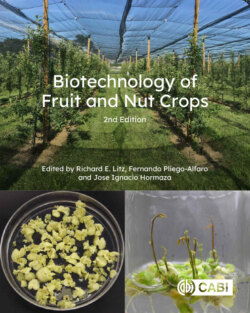Читать книгу Biotechnology of Fruit and Nut Crops - Группа авторов - Страница 183
На сайте Литреса книга снята с продажи.
5. Conclusions
ОглавлениеBiotechnological methods will have an important role in pineapple improvement. Well-established micropropagation techniques have been adopted by private laboratories for the commercial propagation of cultivars demanded by growers and ultimately consumers. Although care is still required for the control of somaclonal variation, strategies are in place to minimize the number of off-types reaching the field and better detection methods are in place. Micropropagation, combined with cryopreservation, has enabled cultivated pineapples and their wild relatives to be conserved for future genetic improvement programmes. Pineapple transformation is now a reality but will require barriers to be broken down before transgenic fruit is commonplace in the world’s markets, while conventional breeding will continue to be important in the development of new cultivars. MAS will become a standard tool for breeders in the future. The large numbers of SSR markers that have been reported facilitate their use in functional genomics, genetic mapping, and discrimination of genotypes, diversity analysis, as well as positional gene-cloning and QTL analysis. The genomics resources now available provide an unprecedented opportunity to study and understand one of the world’s important fruit crops at the molecular level and to apply this technology for pineapple improvement.
